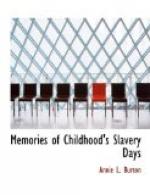RECOLLECTIONS OF A HAPPY LIFE
The memory of my happy, care-free childhood days on the plantation, with my little white and black companions, is often with me. Neither master nor mistress nor neighbors had time to bestow a thought upon us, for the great Civil War was raging. That great event in American history was a matter wholly outside the realm of our childish interests. Of course we heard our elders discuss the various events of the great struggle, but it meant nothing to us.
On the plantation there were ten white children and fourteen colored children. Our days were spent roaming about from plantation to plantation, not knowing or caring what things were going on in the great world outside our little realm. Planting time and harvest time were happy days for us. How often at the harvest time the planters discovered cornstalks missing from the ends of the rows, and blamed the crows! We were called the “little fairy devils.” To the sweet potatoes and peanuts and sugar cane we also helped ourselves.
Those slaves that were not married served the food from the great house, and about half-past eleven they would send the older children with food to the workers in the fields. Of course, I followed, and before we got to the fields, we had eaten the food nearly all up. When the workers returned home they complained, and we were whipped.
The slaves got their allowance every Monday night of molasses, meat, corn meal, and a kind of flour called “dredgings” or “shorts.” Perhaps this allowance would be gone before the next Monday night, in which case the slaves would steal hogs and chickens. Then would come the whipping-post. Master himself never whipped his slaves; this was left to the overseer.
We children had no supper, and only a little piece of bread or something of the kind in the morning. Our dishes consisted of one wooden bowl, and oyster shells were our spoons. This bowl served for about fifteen children, and often the dogs and the ducks and the peafowl had a dip in it. Sometimes we had buttermilk and bread in our bowl, sometimes greens or bones.
Our clothes were little homespun cotton slips, with short sleeves. I never knew what shoes were until I got big enough to earn them myself.
If a slave man and woman wished to marry, a party would be arranged some Saturday night among the slaves. The marriage ceremony consisted of the pair jumping over a stick. If no children were born within a year or so, the wife was sold.
At New Year’s, if there was any debt or mortgage on the plantation, the extra slaves were taken to Clayton and sold at the court house. In this way families were separated.
When they were getting recruits for the war, we were allowed to go to Clayton to see the soldiers.




